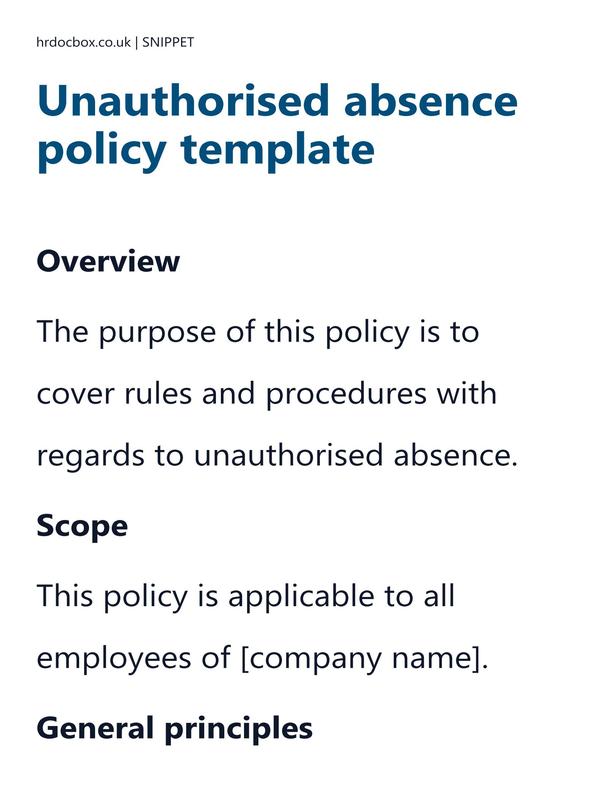Unauthorised absence policy template


Our Unauthorised Absence Policy Template tackles absenteeism, enforces accountability, and maintains a productive work culture.
- Includes 12 months' access to the Unauthorised absence policy template, with all updates provided free of charge and notified to you.
- UK-specific accuracy.
- 159 words over 1 page.
- Last updated 19/06/2023.
- Format: Word / plain text / email.
- Delivery: Instant download after purchase (no physical item).
- Access: Download link shown here after checkout.
- This Unauthorised absence policy template will SAVE you up to 30 mins drafting & research, save you money, and reduce your risk.
Unauthorised absence policy
1 Overview
1.1 The purpose of this policy is to cover rules and procedures with regards to unauthorised absence.
2 Scope
2.1 This policy is applicable to all employees of [company name].
3 General principles
3.1 Definition
If you fail to report for work without prior permission or without notifying the Company and you do not have
This is a 30% preview of the Unauthorised absence policy template. For instant full access, purchase this item or a parent bundle.
Unauthorised absence policy template purpose
An unauthorised absence policy is a set of guidelines and procedures that an organisation establishes to manage situations where employees fail to show up for work without permission or fail to comply with the organisation's policies and procedures for requesting time off.
The policy typically outlines the expectations for attendance, the consequences of unauthorised absences, and the process for addressing and resolving such situations. It may also specify how an employee's pay and benefits may be impacted by unauthorised absences and any disciplinary actions that may be taken.
The policy may require employees to notify their supervisor or manager as soon as possible if they are unable to report to work, and to provide a valid reason for their absence. It may also include provisions for employees who have an extended absence due to illness or injury, and who may be required to provide medical documentation to support their absence.
In cases where an employee does not show up for work without permission or valid reason, the unauthorised absence policy may provide for disciplinary action, such as a verbal or written warning, suspension, or termination. The policy may also include a process for appealing a disciplinary action or for requesting a review of the decision.
Overall, an unauthorised absence policy is designed to ensure that employees are aware of the organisation's expectations for attendance and the consequences of failing to comply with these expectations. It can help to promote a culture of accountability and responsibility among employees, and ensure that the organisation is able to maintain productivity and meet its business objectives.
Practical application of a Unauthorised absence policy template
- Issue the Unauthorised absence policy template during onboarding / after changes / planned refresher.
- Send it to appropriate internal recipients such as employees, workers, contractors etc. and request confirmation that is has been read and understood.
